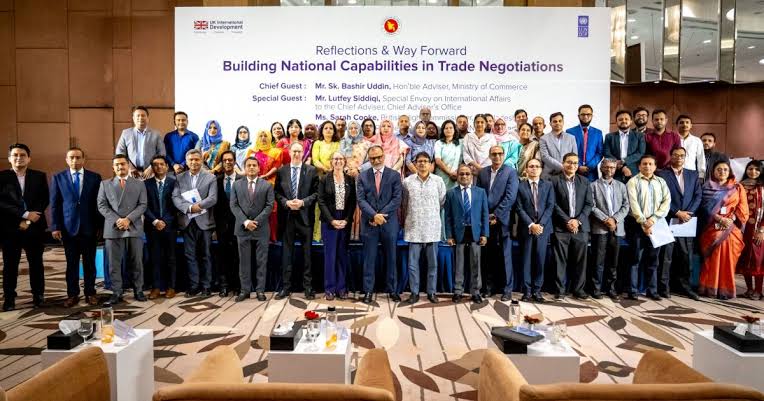12/16/2025

Experts call for stronger trade negotiations capacity ahead of LDC graduation
Staff Correspondent | Published: 2025-09-08 04:48:46

Experts from different sectors on Sunday have underscored the urgency of strengthening Bangladesh’s trade negotiation capacity as the country prepares to graduate from the Least Developed Countries (LDC) category in 2026.
They made the call at a national dialogue titled, “Reflections & Way Forward: Building National Capabilities in Trade Negotiations,” organised by the Ministry of Commerce with support from the United Nations Development Programme (UNDP), under the Transformative Economic Policy Programme (TEPP), financed by the UK Government’s Foreign, Commonwealth and Development Office (FCDO).
During the dialogue, speakers emphasized that building a skilled pool of trade negotiators is crucial for sustaining export growth, diversifying markets and safeguarding Bangladesh’s interests in an increasingly competitive global trading system.
Addressing as the chief guest, Sk Bashir Uddin, adviser to the Ministry of Commerce, called for institutionalising trade negotiation capacity, saying, “As Bangladesh prepares to graduate from LDC status, the Trade Negotiation School will be vital in equipping our negotiators to secure the nation’s interests in a complex global trade landscape.”
He highlighted that during this transition period from LDC status, it is extremely important to build capacity in trade negotiations. This will make it possible to secure favorable trade agreements for the country, which in turn will play a supportive role in sustaining long-term economic growth.
“There are some complexities in trade negotiations. There is also a lack of diversity in exports. Most of the raw materials for the products made in the country are not produced domestically. In many cases, we import intermediate goods from various countries, add value to them, and then export the finished products,” he added.
He also said “Given this reality, we do not have significant strategic advantages in trade negotiations with other countries. Therefore, we need to enhance our capacity in trade discussions.”
Lutfey Siddiqi, chief adviser’s envoy for international affairs, said, “Trade negotiations cannot be approached casually. They demand institutional change, specialist expertise, authority, and continuity to succeed.”
Special Guest Sarah Cooke, British High Commissioner to Bangladesh, reaffirmed the UK’s partnership, “The UK is proud to support Bangladesh to build a new generation of trade negotiators, and we remain firmly committed to supporting its journey toward a modern, inclusive economy”.
Stefan Liller, resident representative of UNDP Bangladesh, stressed that Bangladesh’s graduation is “a call for an economic reset.”
He said, “Bangladesh must craft a new generation of trade and investment strategies, negotiate favourable agreements, and defend its interests in global forums. Central to this effort is a skilled and strategic team of trade negotiators, and I’m delighted the Ministry of Commerce has established such a pool. UNDP, together with the UK Government is proud to support this effort so that Bangladesh not only participates in global trade talks but does so with clarity, unity, and foresight.”
The event, chaired by Commerce Secretary Mahbubur Rahman, also recognised members of the newly formed pool of trade negotiators with certificates. Drawing expertise from ministries, agencies, and academia, this cadre is expected to play a pivotal role in advancing Bangladesh’s trade interests in bilateral, regional, and multilateral forums.
Md Abdur Rahim Khan, additional secretary (Export Wing) at the ministry, Owais Parray, country economic adviser, UNDP Bangladesh and Dr Mohammad Abdur Razzaque, chairman, RAPID, were also amongst many who shared their views.
Editor & Publisher : Md. Motiur Rahman
Pritam-Zaman Tower, Level 03, Suite No: 401/A, 37/2 Bir Protik Gazi Dastagir Road, Purana Palton, Dhaka-1000
Cell : (+88) 01706 666 716, (+88) 01711 145 898, Phone: +88 02-41051180-81